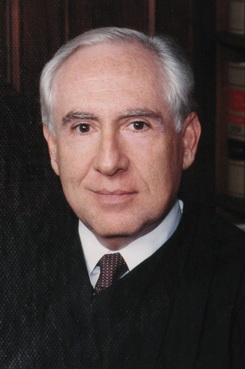11th Circuit: Georgia Can't Copyright Annotated Legal Code
The appeals court reversed U.S. District Judge Richard Story's 2017 decision that the state of Georgia could copyright its annotated legal code, which a nonprofit had posted online for free.
October 22, 2018 at 02:32 PM
4 minute read
 Judge Stanley Marcus, U.S. Court of Appeals for the Eleventh Circuit (Courtesy photo)
Judge Stanley Marcus, U.S. Court of Appeals for the Eleventh Circuit (Courtesy photo)The U.S. Court of Appeals for the Eleventh Circuit on Friday ruled that the annotated version Official Code of Georgia is public record and can't be copyrighted by the state, reversing a federal judge in Atlanta.
In an opinion authored by Judge Stanley Marcus, the appeals court also directed Judge Richard Story of the U.S. District Court for the Northern District of Georgia to enter a judgment for a California public interest group, whose founder has labored for three decades promoting the right of the public to have free access to the laws and regulations that govern them.
The appellate panel also included Senior Judge Frank Hull and Judge Susan Bucklew of the U.S. District Court for the Middle District of Florida.
“There is a substantial public policy interest in public access to state-created legal edicts for many of the same reasons that Congress decided to make all works of the federal government uncopyrightable,” Marcus said in ruling for California-based Public.Resource.org. “Namely because providing free access to such works promotes an informed citizenry.”
In 2013, Carl Malamud—founder of Public.Resource.org—purchased all 186 volumes of the Official Code of Georgia Annotated (O.C.G.A.) and its supplements, scanned them and then uploaded them to a website available to the public for free. He also placed digital copies of the annotated code on USB drives for public distribution, claiming the state had no valid copyright because the law can't be copyrighted.
When the state Code Revision Commission, an arm of the Georgia General Assembly, filed suit alleging copyright infringement, Malamud countersued.
Although a nonannotated version of the state legal code is available online for free through a contract with Lexis, the state sells the annotated version for $404. The state also collects royalties from Lexis, which has exclusive rights to sell print, CD-ROM and online versions of the annotated code in return for royalties on CD and online sales.
The annotated code includes legislative history, judicial case notations, repeals, cross references, commentaries, excerpts from law review articles, summaries of opinions of the attorney general of Georgia and summaries of advisory opinions of the State Bar of Georgia.
In Georgia, unlike most states, the only official version of the state code is the annotated one. The non-annotated version is not the authoritative law and may not be cited as such, Marcus noted.
Even so, Story ruled for the state, citing a long line of cases extending copyright protection to annotations, citations and notes that are not part of the actual text of the law. Malamud's Georgia website went dark while he appealed.
When Malamud learned of the ruling Friday, he tweeted, “To the people of Georgia: This law is your law. This law is my law. From the Blue Ridge Mountains to the Savannah River. From Morehouse College to the Vidalia fields. This law was made for you and me.” Within hours, the free annotated state code was back online.
Malamud also tweeted a shoutout to his Alston & Bird legal team led by partner Elizabeth Rader in Washington, D.C.; Washington lawyer David Halperin, counsel to Public.Resource.org; the ACLU of Georgia and “a huge collection of amici for supporting this radical idea that the law belongs to the people. Lawyers like you make democracy work.”
The state was represented by Tony Askew, who led a team of lawyers from Atlanta's Meunier, Carlin & Curfman. Askew was not immediately available for comment.
In reversing Story, the appeals panel decided the state code annotations are “law-like,” and not subject to copyright because the Georgia General Assembly “is the driving force behind their creation.” Annotations by law must be adopted annually by the General Assembly.
The state Code Revision Commission, which “exerts authoritative influence” over the creation of the annotations, “indisputably is an arm of the General Assembly,” Marcus said.
“The annotations cast an undeniable, official shadow over how Georgia laws are interpreted and understood,” Marcus continued. “Indeed, Georgia's courts have cited to the annotations as authoritative sources on statutory meaning and legislative intent. … The resulting work is intrinsically public domain material, belonging to the people, and, as such, must be free for publication by all. As a result, no valid copyright can subsist in these works.”
This content has been archived. It is available through our partners, LexisNexis® and Bloomberg Law.
To view this content, please continue to their sites.
Not a Lexis Subscriber?
Subscribe Now
Not a Bloomberg Law Subscriber?
Subscribe Now
NOT FOR REPRINT
© 2025 ALM Global, LLC, All Rights Reserved. Request academic re-use from www.copyright.com. All other uses, submit a request to [email protected]. For more information visit Asset & Logo Licensing.
You Might Like
View All
12-Partner Team 'Surprises' Atlanta Firm’s Leaders With Exit to Launch New Reed Smith Office
4 minute read
After Breakaway From FisherBroyles, Pierson Ferdinand Bills $75M in First Year
5 minute read
On the Move: Freeman Mathis & Gary Adds Florida Partners, Employment Pro Joins Jackson Lewis
6 minute readTrending Stories
- 1Silk Road Founder Ross Ulbricht Has New York Sentence Pardoned by Trump
- 2Settlement Allows Spouses of U.S. Citizens to Reopen Removal Proceedings
- 3CFPB Resolves Flurry of Enforcement Actions in Biden's Final Week
- 4Judge Orders SoCal Edison to Preserve Evidence Relating to Los Angeles Wildfires
- 5Legal Community Luminaries Honored at New York State Bar Association’s Annual Meeting
Who Got The Work
J. Brugh Lower of Gibbons has entered an appearance for industrial equipment supplier Devco Corporation in a pending trademark infringement lawsuit. The suit, accusing the defendant of selling knock-off Graco products, was filed Dec. 18 in New Jersey District Court by Rivkin Radler on behalf of Graco Inc. and Graco Minnesota. The case, assigned to U.S. District Judge Zahid N. Quraishi, is 3:24-cv-11294, Graco Inc. et al v. Devco Corporation.
Who Got The Work
Rebecca Maller-Stein and Kent A. Yalowitz of Arnold & Porter Kaye Scholer have entered their appearances for Hanaco Venture Capital and its executives, Lior Prosor and David Frankel, in a pending securities lawsuit. The action, filed on Dec. 24 in New York Southern District Court by Zell, Aron & Co. on behalf of Goldeneye Advisors, accuses the defendants of negligently and fraudulently managing the plaintiff's $1 million investment. The case, assigned to U.S. District Judge Vernon S. Broderick, is 1:24-cv-09918, Goldeneye Advisors, LLC v. Hanaco Venture Capital, Ltd. et al.
Who Got The Work
Attorneys from A&O Shearman has stepped in as defense counsel for Toronto-Dominion Bank and other defendants in a pending securities class action. The suit, filed Dec. 11 in New York Southern District Court by Bleichmar Fonti & Auld, accuses the defendants of concealing the bank's 'pervasive' deficiencies in regards to its compliance with the Bank Secrecy Act and the quality of its anti-money laundering controls. The case, assigned to U.S. District Judge Arun Subramanian, is 1:24-cv-09445, Gonzalez v. The Toronto-Dominion Bank et al.
Who Got The Work
Crown Castle International, a Pennsylvania company providing shared communications infrastructure, has turned to Luke D. Wolf of Gordon Rees Scully Mansukhani to fend off a pending breach-of-contract lawsuit. The court action, filed Nov. 25 in Michigan Eastern District Court by Hooper Hathaway PC on behalf of The Town Residences LLC, accuses Crown Castle of failing to transfer approximately $30,000 in utility payments from T-Mobile in breach of a roof-top lease and assignment agreement. The case, assigned to U.S. District Judge Susan K. Declercq, is 2:24-cv-13131, The Town Residences LLC v. T-Mobile US, Inc. et al.
Who Got The Work
Wilfred P. Coronato and Daniel M. Schwartz of McCarter & English have stepped in as defense counsel to Electrolux Home Products Inc. in a pending product liability lawsuit. The court action, filed Nov. 26 in New York Eastern District Court by Poulos Lopiccolo PC and Nagel Rice LLP on behalf of David Stern, alleges that the defendant's refrigerators’ drawers and shelving repeatedly break and fall apart within months after purchase. The case, assigned to U.S. District Judge Joan M. Azrack, is 2:24-cv-08204, Stern v. Electrolux Home Products, Inc.
Featured Firms
Law Offices of Gary Martin Hays & Associates, P.C.
(470) 294-1674
Law Offices of Mark E. Salomone
(857) 444-6468
Smith & Hassler
(713) 739-1250







